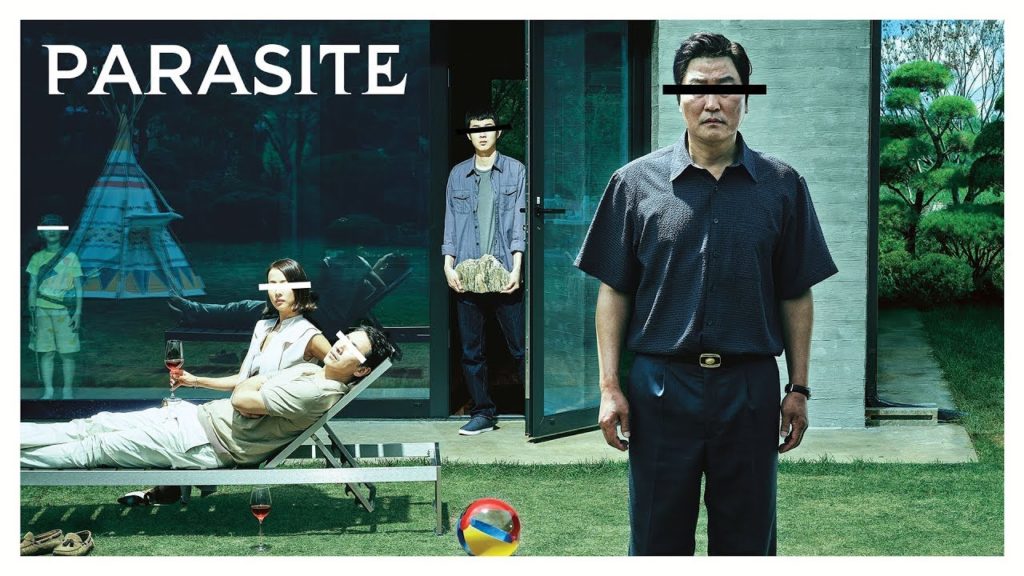I went into Parasite not knowing a ton about what it, or Bong Joon-Ho was all about. My friend Phil invited me to go see this film because he knows I’m a fan of Japanese and Korean films. I had seen the trailer and thought it looked intriguing, but then I saw the movie being critically acclaimed as one of the best films of the year and I wanted to see it and decide for myself whether it lives up to the hype.
Before you continue reading, if you haven’t seen in the title, this review WILL contain spoilers – a LOT of them. If you have not seen Parasite yet, I highly recommend bookmarking this page, going to see the movie, and then returning to share and compare your thoughts on the film.
If you have NOT seen this film, I would recommend heading over to my friend Anthony’s website to check out his review of the film here: Anthony Freeze Film Reviews – Parasite. His review is spoiler free.
The following is just my interpretation and breakdown of the film Parasite. There are a lot of elements in this film that I am sure I did not even pick up on. It’s such a deep movie with so many layers and themes, it’d take a few more sittings to really dig into everything. However, there may also be some elements that I picked up on that you may have missed your first time watching.
AGAIN….WARNING….THIS REVIEW WILL CONTAIN SPOILERS!! TURN BACK NOW IF YOU HAVE NOT SEEN THE FILM!!
So let’s get started on this Parasite Breakdown. Parasite is a Korean film by director Bong Joon-Ho released in 2019. It starts by inviting us into the home of a struggling family just trying to get by. In the opening scenes of the film, it is all too apparent that the main characters of this film are living day to day, barely able to scrape by as we are shown they decide to leave their windows open in order to get “free fumigation” and are all too familiar with the local drunkard pissing in plain view from their front windows.
As you continue to watch, the plot of the film seems fairly straight forward. This low class family is going to take advantage of a lucky opportunity to move up in the world and start living as they feel they deserve. A common theme in many popular Hollywood films right? No surprises there…you would think.
Continuing with common film trends, we learn about this unique opportunity that falls into Ki-woo’s lap. Ki-woo is a young man and the son in this lower class family. His friend offers him the opportunity to take his place as the tutor for a wealthy family’s daughter and all he has to do is lie about his credentials and he’ll be fine.
So as we follow his adventure throughout the movie, he deceives the rich family in order to live a life he would otherwise never have. But not only does he deceive this rich family, he slowly works his entire family into working for them and soon his entire family is now working and enjoying the perks and luxuries available to the rich.
However, good fortune does not last forever. And this is where the story really throws us for a loop with unpredictable twists and turns that keep you on the edge of your seat.
Since I’ve warned of spoilers, I am going to trust that if you are still reading this review, you have seen the film and do not need a synopsis of the film. So I will get right into the details of how I interpreted this film.
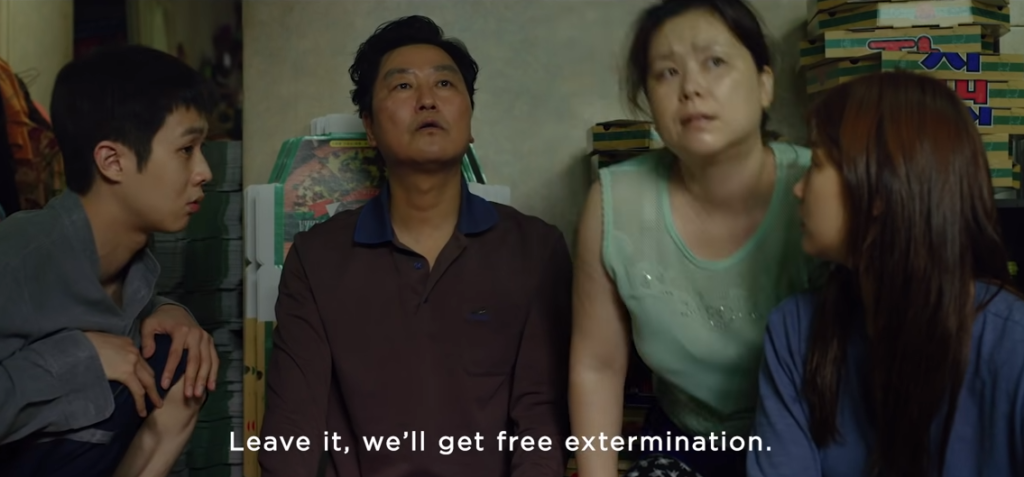
Fumigation
Right from the start of the film, you are shown that there is something wrong with this lower class family situation. Ki-Taek (the father in the family) sees the cloud of fumigation coming toward their home and tells his daughter Ki-Jung to leave the windows open saying, “Leave it, we’ll get free fumigation.”.
Immediately I thought to myself, wow. That is extreme! Not only is the father not worried about the health implications of exposing the family to fumigation meant for rodents and insects, but as the fumigation flows into their home, he seems completely unphased by it even happening. Not a cough, not a flinch, nothing!
What kind of life has this man had that renders him completely immune to this fumigation. It’s as if he’s completely resistant to it? The reason for this becomes apparent two scenes later in the film: one where his wife calls him a cockroach and a second where he explains how nothing matters at all where he shows that he is not only immune to fumigation, but immune to acts like “killing a person” and “betraying your country”.
The Scholar’s Rock
Shortly after we are made aware of the social and economic class of the family, Ki-woo is visited by a friend who will be traveling abroad and wanted to give Ki-woo a gift: the scholar’s rock. The scholar’s rock is said to bring luck and fortune to it’s owner.
As Ki-woo accepts the gift we hear him say, “This is so metaphorical.”
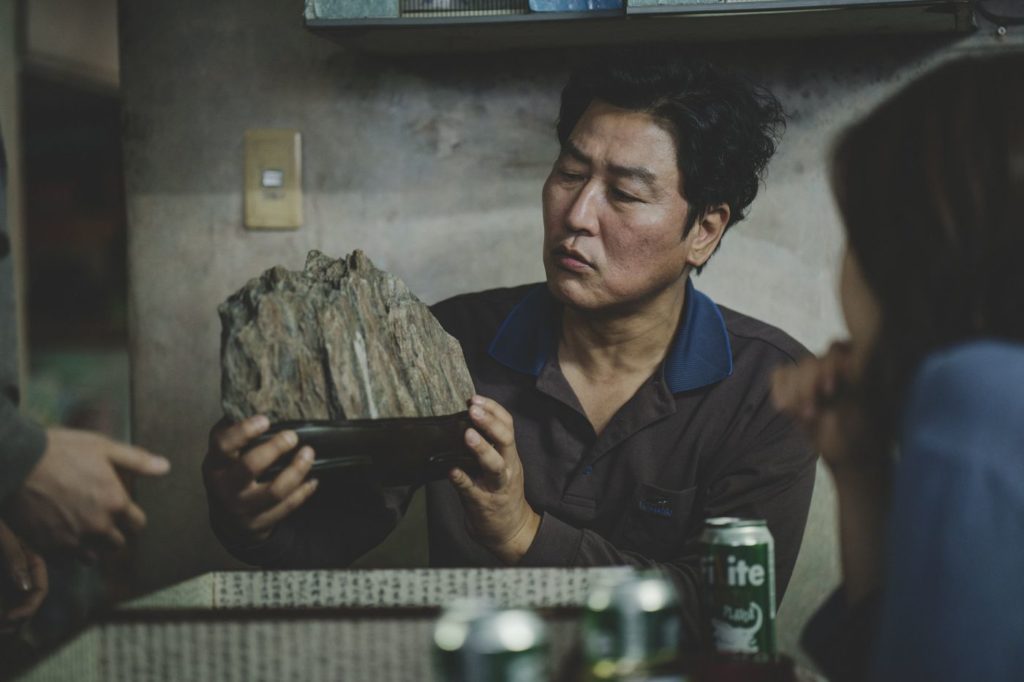
When I first heard this, I thought nothing of it. I figured, “of course the rock is metaphorical. They’re a low class family being gifted a rock that will supposedly bring them all the luck and wealth they deserve!”.
As I look back on the film, it becomes much more apparent just exactly how brilliantly metaphorical this rock really is.
For me, the scholar’s rock represents Ki-woo’s hopes and dreams. He views this rock as the cause of his opportunity to experience wealth.
Ki-woo’s friend gifted him this rock along with an opportunity. All he had to do was lie and become someone he is not in order to get ahead in the world and achieve the wealth and success of his dreams. Of course, he jumps at the opportunity and makes his move and interviews for the opportunity to tutor the daughter of a rich, upper class, successful family.
Despite the Kim family being skilled and talented as displayed by the mother’s medal for winning shotput and the daughters expert graphic design skills when creating Ki-woo’s forged papers, this all meant nothing when it came down to actually finding real jobs. Their fate was determined by the chance opportunity of knowing a person in a position of power who gave them an opportunity and access to wealth.
As the saying goes, “It’s not What you know…it’s Who you know”.
None the less, Ki-woo is literally pummeled and beaten down by his “hopes and dreams” in one of the final scenes of the movie.
I found this to be quite a shame because Ki-woo was one of the positive characters in the film. In the early scene when he has the forged papers, his father says to him, “I’m proud of you”.
Ki-woo replies with, “Dad, I don’t think of this as forgery or crime. I’ll go to this university next year.” He is positive, optimistic, hopeful for his future.
Ki-taek replies, “So you’ve got a plan!” and genuinely seems excited for him and is proud of his hopeful dreams.
However, later in the movie after the floods hit, Ki-taek shares his own outlook on plans, hopes, and dreams.
His dad tells him, “You know what kind of plan never fails? No plan. No plan at all. You know why? Because life cannot be planned…Even if the country gets destroyed or sold out, nobody cares. Got it?”
One of the few positive moments of the film is that by the end of everything, Ki-woo still has a positivity about him with the hopes and dreams when he says, “Dad, today I made a plan – a fundamental plan. I’m going to earn money, a lot of it…[and] when I have money, I’ll buy the house.”
Even though it’s clear from the final scene of the film that there is no way Ki-woo will ever be able to fulfill that dream, he continues to have hope.
Basquiat Painting
When Ki-woo first visits the Park residence, he is shown a painting painted by their son Da-song. Ki-woo says it’s a work of brilliance and asks if it’s a chimpanzee. Mrs. Park replies that it is a “self-portrait.”
The scene really sets the tone for the events to come, but what is even more impressive is that this particular painting seems to have been influenced by the American artist Jean-Michel Basquiat.
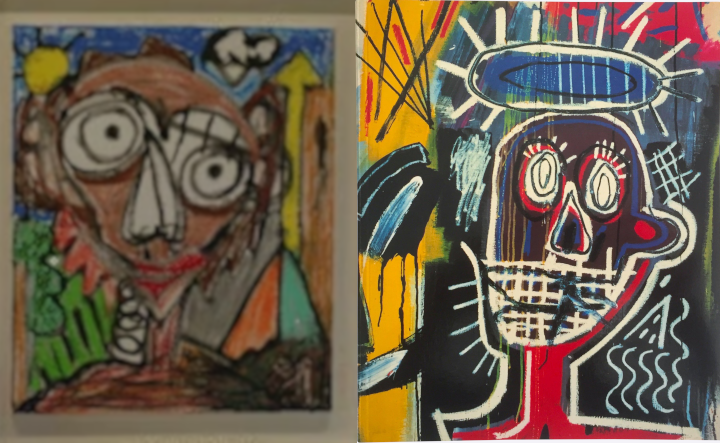
Basquiat was a famous artist and was the highest selling American artist ever at the Sotheby’s auction in 2017 where his 1982 painting sold for $110.5 million.
Basquiat’s art is referenced to have inspired many hip hop music artists such as Jay-Z and Wyclef Jean. He started as part of a graffiti duo in Manhattan during the 1970’s. Basquiat’s art focused on issues such as class warfare, wealth vs poverty, and criticism of colonialism.
Cockroaches & Parasites
Throughout this movie, Chung Sook refers to her husband Ki-taek as a cockroach. Soon after she says this in one scene, the Park family returns home and the entire Kim family immediately scatters around the house hiding to avoid detection. Cockroaches are know for carrying parasites and are now becoming resistant and even immune to pesticides.
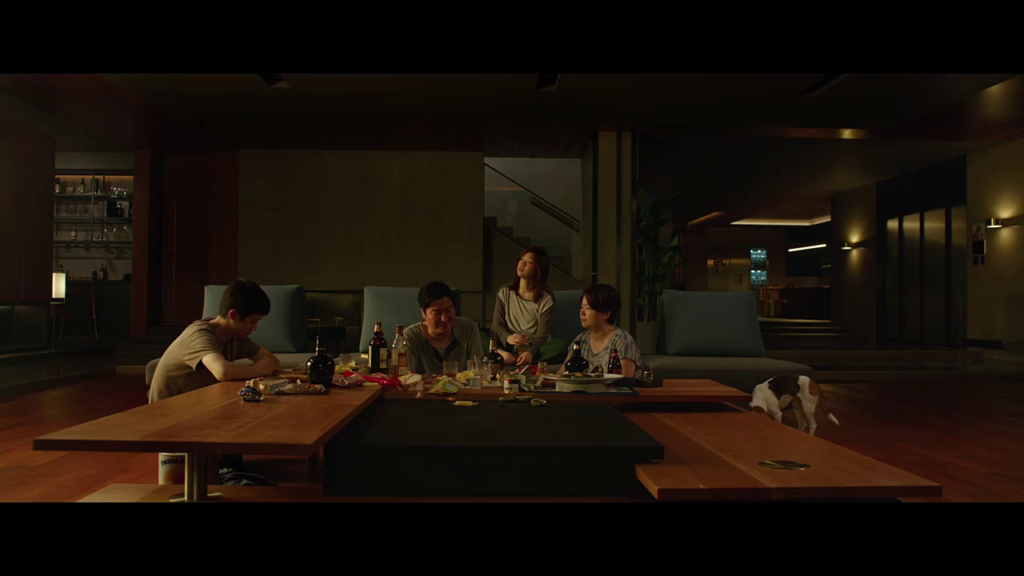
This is an interesting tie in to the fumigation scene in the beginning of the film. When the family sees the fumigation coming, the daughter is the first to say, “Close the windows!”. However, Ki-taek says no and that they will take the free fumigation.
While the rest of the family coughs and chokes on the fumigation, Ki-taek is completely unaffected by the situation and continues on folding pizza boxes as if nothing had even happened. This displays that Ki-taek is much more parasitic and has grown immune to these forms of elimination.
While his less parasitic daughter is the only one to die from his family, he continues to retreat to the basement…the darkest place below ground where he can hide until things become safe again.
The Family in the Basement
If you noticed from the fumigation scene, the Kim family’s home is located at ground level – half above ground and half below ground. As Ki-woo approaches the Park family’s residency, he climbs a very steep hill in order to demonstrate the elevation of status between the two families.
Even when in the Park family is home, the Parks never enter the room between the house and the basement. At first it struck me as odd how they would have never discovered the scratch marks of the hidden passageway, but then I realized that Bong Joon-Ho did this intentionally.
The Park family stayed completely above ground the entire movie while the Kim family stayed half above and half below ground. We then discovered that there is another family deep in the basement below ground. This represented an even lower class family who were even more worse off than the Kim family.
What I found most interesting about the discovery of this third family is the way that the Kim family treated them. Immediately, the Kim family treated them with nearly the exact same prejudices they judged the Park family for treating them with!
What I love about how Bong Joon-Ho directed these scenes with the basement family is that it aggressively addresses the absurdity of this parasitic behavior. Whether the rich family, the middle class family, or the basement poorest of poor family, they are each parasitic in their own way.
The line between good and bad is so ambiguous that you don’t know which characters in the film are the good ones and which are the bad! In the end, they all seem to possess similar traits depending on their status and current situation.
Nuclear Launch Button
Once the Kim family is discovered by the family in the basement, they are put into a state of fear and lose all control of their situation. The video recorded could completely blow their entire cover and their new life would be ruined.
As Mun-kwang records this video, Ki-woo calls Ki-taek “dad” and they realize they now have power over them. Once this happens, they treat the Kim family as prisoners forcing them to raise their hands in the air as they celebrate and enjoy their new position of power.
Mun-kwang refers to this video as a “nuclear launch button” representing the power to blow their cover with the click of a button. Throughout the film, the power dynamics switch so much that you realize given the right circumstances and position, each person in the film falls prey to similar parasitic behaviors at different points throughout the film.
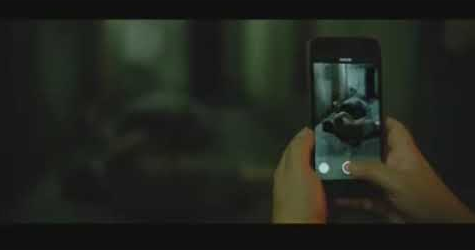
I’m not sure if Bong Joon-Ho had this in mind when writing this scene, but the reference to the phone being like a “nuclear launch button” felt very similar to social media today. In a world where we often post on social media and share only the best parts of our lives, it would destroy some people to even consider the thought of sharing their “real” selves with the world.
Many people are creating their own pressures on social media and pushing themselves to live up to a standard of “keeping up with the Joneses”. I feel like this theme fit well into the movie in showing that money and status is not everything. Focusing on what’s important in life, being who you are, and treating others without prejudice is what will keep you out of a situation like the Kim family got themselves stuck in.
Obliviousness to Suffering
Once the flooding hits and the Kim family is fleeing from the Park’s home, we see the massive descent back to their original status. Bong Joon-Ho did an excellent job with the cinematography here to show just how far they had to travel and descend back to their home.
In the following scenes, they are shown being forced to stay in a shelter packed tight with many others who’s homes had been flooded.
Mrs. Park is planning to host a party and is completely oblivious to the suffering and plight of the poor as she talks on the phone and routes through her fancy closet to choose her outfit for the party. Meanwhile, in the very next scene, the Kim family is shown to be trying to scrounge clothes that fit from a massive pile of shared clothing in the shelter they are staying in.
This is when we are shown that Mrs. Park is completely oblivious to the fact that anything is even happening as we see Mr. Park escorting her around as if he hadn’t just lost his home and all their possessions aside from what they chose to grab before their home flooded.
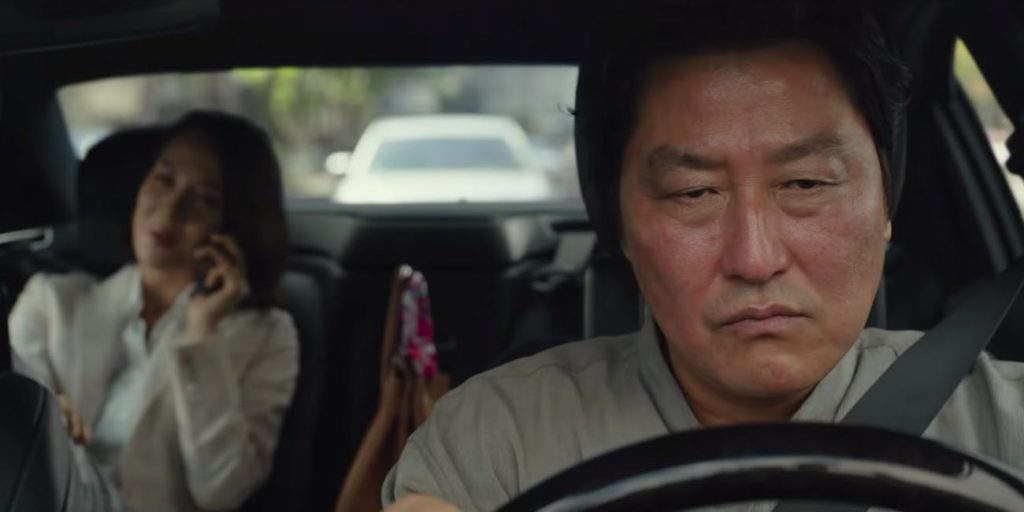
As Ki-taek drives Mrs. Park back to her house for the party, this is when he really takes offense to her covering her nose to avoid his “smell” and opening the window of the car. You can see the contempt in Ki-taek’s face as she does this and foreshadows and solidifies the thoughts in his speech in the previous scene about how, “It doesn’t matter. Even if you kill someone or betray your country.”
To Ki-taek, nothing matters. He is numb to everything, just like a cockroach resistant to fumigation.
Mutual Parasitic Prejudices
One of the best lines of the entire film is when Ki-taek says, “They are rich, but still nice” and his wife Chung-sook replies with, “They are nice because they are rich.”
Chung-sook does not believe that the rich can genuinely be “nice”. Regardless of how the Park family treats her, she believes that they are only nice because they are rich. As she is explaining, “If I were rich, I would be nice too!”, she is seen pushing the dog away from the table, showing her true nature. This prejudice is one form of her loser think and one of the characteristics that prevents Chung-sook from ever being able to elevate her status.
Each character in the film has a similar prejudice about the other. Mr. Park references a smell…”the same smell on all of them”. He says it is a smell similar to all people who ride the subway and metros and have a “basement” smell – one that cannot be washed away and can only be removed by living a completely different lifestyle aka being rich.
Mr. Park also continues to say throughout the movie that he is okay with people, “as long as they don’t cross the line.” What he is saying is that he can tolerate the “lower class” assuming they don’t cross the line and interfere with his own life.
He says it would have been fine if his driver had sex in his car so long as it wasn’t in his seat. But he had the nerve to have sex in the back seat where Mr. Park sits and that “crossed the line” and got him fired. Tolerating people as long as they don’t cross the line is not the same as accepting people with no prejudice.
Ki-Taek has such a strong reaction to this in the final scenes of the film because he is made aware that Mr. Park does not respect him and will never respect him due to his status (and smell). Mrs. Park covers her nose and opens the window while Ki-Taek is driving her back from the super market and you can see Ki-Taek’s facial expression change. For me, this was the moment that fueled his anger released in the party scene later.
These prejudices are what forever hold these characters in stasis, unable to free themselves from their own parasitic thoughts.
But who is more parasitic? The elite family who believe the lower class can never remove a stench because they’re not rich? Or the lower class family who leech off the rich and believe that the upper class are terrible people who are only nice because they are rich?
Each feeds off the other and they all continue to spiral into more parasitic behavior.
My Take on the Parasite Ending
So what is my final conclusion about the Korean movie Parasite by Bong Joon-Ho?
Who are the parasites? I believe they are all parasites feeding off of each other to their own demise.
I would like to believe that Bong Joon-Ho wanted his viewers to feel that class warfare is parasitic on all levels and that in order to combat it, we need to dismiss our usual prejudices of class.
However, that is what I would “like” to believe. In reality…I believe it is just the opposite.
Bong Joon-Ho clearly knew what he was doing with this film and he executed it masterfully. Each decision was carefully curated to express a specific point in precisely the way it needed to be expressed, and I’d be kidding myself if I said I caught even half of the subtle nuances on my first viewing of the film.
For me, the final scene capped the movie off with a strong reminder that no matter how much Ki-woo wished and hoped that he could make a plan, earn the money to buy the house, and save his father…this was never going to happen.
His hopes and dreams were still misguided after everything he had been through when he says, “I’m going to earn money, a lot of it. University, a career, marriage, those are all fine, but first I’ll earn money. When I have the money, I’ll buy the house.”
His final letter of hope still focuses solely around money being the solution to all his problems. This is why he has fallen back into a prison of his own making, despite the monumental opportunity he was given.
So I choose to take that as a lesson to avoid falling for the same parasitic beliefs as Ki-woo. The misguided hopes and dreams that resulted in a fate of oblivious, self-inflicted stagnation, or worse yet…the complete state of despair and misery Ki-taek has found himself in.
There is so much more to be said about this movie so leave a comment below or reach out to me on social media if you agree (or disagree) with my Parasite breakdown and interpretation of Bong Joon-Ho’s vision for Parasite! I would love to hear what you enjoyed most about the film!
